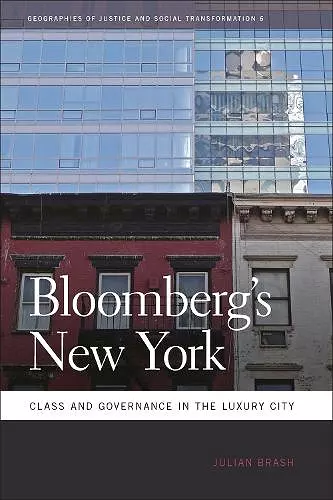Bloomberg's New York
Class and Governance in the Luxury City
Format:Paperback
Publisher:University of Georgia Press
Published:15th Jan '11
Currently unavailable, and unfortunately no date known when it will be back

New York mayor Michael Bloomberg claims to run the city like a business. In Bloomberg’s New York, Julian Brash applies methods from anthropology, geography, and other social science disciplines to examine what that means. He describes the mayor’s attitude toward governance as the Bloomberg Way—a philosophy that holds up the mayor as CEO, government as a private corporation, desirable residents and businesses as customers and clients, and the city itself as a product to be branded and marketed as a luxury good.
Commonly represented as pragmatic and nonideological, the Bloomberg Way, Brash argues, is in fact an ambitious reformulation of neoliberal governance that advances specific class interests. He considers the implications of this in a blow-by-blow account of the debate over the Hudson Yards plan, which aimed to transform Manhattan’s far west side into the city’s next great high-end district. Bringing this plan to fruition proved surprisingly difficult as activists and entrenched interests pushed back against the Bloomberg administration, suggesting that despite Bloomberg’s success in redrawing the rules of urban governance, older political arrangements—and opportunities for social justice—remain.
Brash persuasively argues that Michael Bloomberg's image as a 'CEO Mayor' who governs New York in a nonpolitical and nonideological way does not reflect the agenda behind 'Bloomberg's Way.'
A very substantial contribution to the study of politics and governance in New York City and to scholarship on urban development politics more generally. Brash’s ability to move gracefully between conceptual issues and empirical detail makes the book highly readable and even entertaining; the chapters on the Hudson Yards case, for example, should be required reading for courses on urban planning.
* author of Remaking New York: Primitive Globalization and the Politics of Urban Community *Brash’s insightful book provides the first thorough examination of the Bloomberg administration—increasingly touted as an example to follow by cities across the nation—and in so doing extricates the antidemocratic dimensions involved in the corporatization of urban government. Bloomberg’s New York should be immediately influential across urban studies disciplines.
* author of Barrio Dreams: Puerto Ricans, Latinos, and the Neoliberal City *[B]rilliant. . . . Written with an academic audience in mind, the book uses a well-reported history of the Hudson Yards master plan/Olympics wet dream to lay out a devastating critique of the CEO mayor, his vision of the city as a product to be marketed, and citizens as passive consumers of it.
Bloomberg’s New York is both a powerful and nuanced argument for undertaking detailed empirical analysis of urban economics and governance under neoliberalism.
* Social and Cultural Geography *Brash’s detailed case study shows the strengths and weaknesses of the tactics and strategies adopted by community groups in circumstances that, while exceptional, can be easily analogized to those surrounding large-scale redevelopment projects in other strong real estate markets. . . . Brash himself recognizes that effective resistance against the Bloomberg Way must go beyond this unmasking; it must offer an alternative linking of governance, urban imaginary, and class.
* Journal of Planning Education and ResearchISBN: 9780820336817
Dimensions: 229mm x 152mm x 20mm
Weight: 544g
344 pages